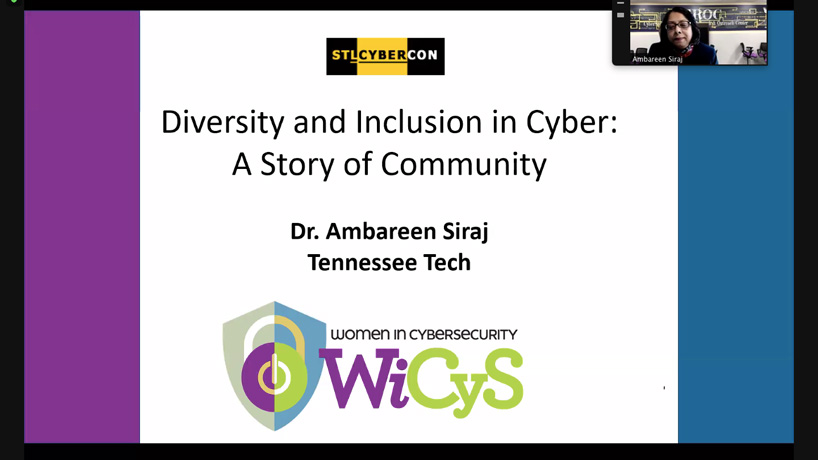
Ambareen Siraj, a professor and the director of Cybersecurity Education, Research, and Outreach Center at Tennessee Tech University, was among the presenters at STL CyberCon 2020 and talked about ways to encourage gender diversity and inclusion in the field of cybersecurity. She described the success of WiCyS, which she launched in 2012 with a grant from the National Science Foundation. (Screenshot from Friday’s webinar)
STL CyberCon has been bringing together students, researchers, practitioners and job seekers from across the St. Louis region each fall over the past six years to share insight and ideas about the fast-evolving world of cybersecurity.
This year, the conference, hosted annually by the University of Missouri–St. Louis, took advantage of being held in a virtual format to expand its reach. Nearly 350 people registered for the 4½-hour event held last Friday morning, and they logged in from as far away as Kuwait and India.
Organizers also made a concerted effort to be more inclusive and connect with a more diverse audience.
“The goal of the conference is to reach out to the community and raise awareness about cybersecurity,” said Anshuman Singh, a member of the organizing committee and an associate professor in the Department of Information Systems and Technology in UMSL’s College of Business Administration. “We cannot do that leaving out half of the population. Women are very underrepresented in cybersecurity for a variety of reasons. We wanted to present women leaders in cybersecurity from academia and industry.”
Blair Taylor, a clinical professor in the Department of Computer and Information Sciences at Towson University in Maryland, delivered the keynote presentation, titled “Open Your Mind to Cyber.”
“Since I started off in cyber years ago, the same question gets asked a lot,” Taylor said as she began her remarks. “The question is what is the No. 1 thing you can do to improve cybersecurity? Invariably, the answer is the same and that is create a security mindset.”
Cybersecurity threats are not going away. As Taylor noted, there is a hacker attack every 39 seconds. It takes an average of 206 days to identify a breach, and it takes 50 days to mitigate a malware attack.
Companies already spend billions of dollars each year on cybersecurity, and in the midst of the COVID-19, the dependence on information and telecommunication is greater than it has ever been, creating opportunities for cyber criminals with phishing attacks increasing by an estimate 400 percent.
“Cybersecurity is a shared responsibility in our everyday lives,” Taylor said. “Cybersecurity is everybody’s business.”
There remains a shortage of cybersecurity talent throughout the workforce, and Taylor pointed to an estimate by Cybersecurity Ventures that there will be 3.5 million unfilled cybersecurity jobs globally by 2021.
Recruiting more women into the field is one way to begin shrinking that gap.
Ambareen Siraj, a professor and the director of the Cybersecurity Education, Research, and Outreach Center at Tennessee Tech University, followed Taylor’s keynote with a presentation of her own titled “Diversity and Inclusion in Cyber: A Story of Community.”
“What I’m here to tell you today is how a community came together, stayed together and, most importantly, worked together to move the needle in representation among women in cybersecurity,” Siraj said.
She described the creation of WiCyS – Women in Cybersecurity – which is the only non-profit membership organization with international reach dedicated to bringing together women in cybersecurity from academia, research and industry to share knowledge, experience, networking and mentoring. The initiative began in 2012 through a grant Siraj received from the National Science Foundation. The organization has worked to facilitate the recruitment, retention and advancement of women in the field.
WiCyS now counts more than 6,000 members, half of whom are students. It holds a conference each year, and in 2019, it brought more than 1,300 attendees to Carnegie Mellon University in Pittsburgh, Pennsylvania.
STL CyberCon attendees last week also had a chance to hear from Jennifer I. Raiford, who has built a 25-year career in information security and compliance and now serves as a global client facing security and privacy officer at Unisys, an information technology company headquartered in Blue Bell, Pennsylvania.
Other presenters were Mike Green, the chief information security officer at Cigna Health Services, and Reza Tourani, an assistant professor of computer science at Saint Louis University. There was also a panel discussion, moderated by Singh, on cybersecurity education.
UMSL has more than 700 students enrolled in its computer science, computer technology, information systems and cybersecurity programs. The National Security Agency and Department of Homeland Security have designated UMSL a National Center of Academic Excellence in Cyber Defense Education.














